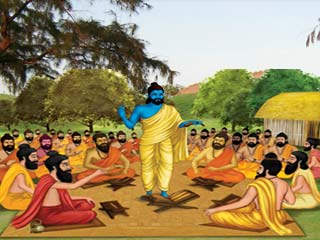Revolution Of 1857
In 1856 Canning came in as Governor General. By his arrival, the political-administrative integration of almost the whole of India had taken place, but due to the colonial exploitation and oppression of the British Raj, there was widespread discontent among the people. Which gave rise to the Great Rebellion in 1857. This rebellion shook the roots of British rule. It was started by the Indian soldiers of the Company's army, but soon other classes of people from its periphery also started joining. This rebellion was the result of the accumulated discontent in the hearts of the people against the policies of the government and hatred towards the foreign power. In the administrative, economic, social and religious spheres, the feeling of confusion and dissatisfaction created by the policies of the British was expressed in the rebellion of 1857 through the army, feudal and public.
Reason :- There were many reasons for the revolt of 1857, which are as follows:-
1. Financial cause
2. Political cause
3. Social cause
4. Religious cause
5. Military cause
6. Immediate cause
Financial cause :-
Perhaps the most important cause of public discontent was the economic exploitation of the country by the British and the destruction of the traditional economic structure of the country. The impact of the economic policies of the British government fell on the farmers, landlords, artisans of India and the feeling of dissatisfaction spread among them.
The condition of the farmers became pathetic due to various land revenue systems, exorbitant rate of land revenue, improper recovery by landlords and employees, evictions, corruption, moneylender exploitation.
Lord William Bentinck took away a lot of tax free land during his reign. The ancestral rights of the old zamindars and talukdars were snatched away.
Indian artisans, cottage industries and traders were devastated by the policy of industrialization, as a result of which poverty, unemployment, hunger spread everywhere.
Lack of government help in calamities like drought, famine, flood, epidemic.
The expulsion of Indian wealth took place at a rapid pace towards England.
Political cause :-
Disrespect to the Mughal Emperor, the decision to abolish the title of Badshah after Bahadur Shah and remove the Mughals from the Red Fort.
Dalhousie annexed Satara, Jaitpur, Sambalpur, Baghat, Jhansi, Nagpur into the Indian Empire through his annexation policy. Rani Laxmibai strongly opposed the merger of Jhansi.
Hindus were angered by this usurpation policy that denied adoption rights.
By merging Awadh on the basis of misrule, Dalhousie angered the people there, the Talukedal and the soldiers of Awadh region appointed in the British army.
Discontent spread with the British's policy of expansion and merger. Dissatisfaction with the termination of pension and termination of posts of others including Nana Saheb.
Due to the abolishment of the old system by the British, there was dissatisfaction among the individual beneficiaries associated with the old administration system.
Social cause :-
The British tried to spread western education, culture, which caused fear and discontent among the orthodox Indians.
The ban on the practice of Sati (1829), the Widow Remarriage Act (1856), the ban on female murder was not acceptable to orthodox Indians.
The Indian people were also agitated by the "policy of caste discrimination" and behavior of the British.
The traditional upper-middle classes such as the subsidized clerics, pandits, courtiers, artists and handicrafts were dissatisfied with their employment and sources of income being lost.
Religious cause :-
Attempts to convert to Christianity for the propagation of Christianity.
Religious Disabilities Act 1856.
Sharp criticism of Indian gods and goddesses, saints, great men, customs, traditions by religious preachers.
End of religious privileges.
The new education system and educational institutions, many of which were founded by Christian missionaries, were viewed with suspicion.
Due to the work done by the British in the railway, post and telegraph sector as a means of propagating religion among Indians only, rebellious feeling towards the British flared up in their mind.
Military cause :-
Promotion avenues are closed for Indian soldiers in the British army. The highest post for Indians was the Subedar.
The pay was also extremely low compared to European soldiers.
After the merger of Sindh, Punjab, foreign allowance to soldiers was stopped.
Indian soldiers were not free to use religious symbols like tika, beard, turban.
At the time of Canning, the General Service Enlistment Act was enacted, according to which service across the sea was made mandatory, while the Hindus of the time believed that having the sea corrupted religion. Thus, like other Indians, the Indian soldiers also became convinced that their religion was in danger.
A large number of Awadh soldiers were in the British army. These soldiers were furious at the humiliation of their Nawab.
Immediate cause :-
Under these circumstances, the company government used the Enfield rifle, whose cartridge packet had to be cut with teeth. The soldiers came to know that the fat of cow and pig was used in the cartridges, due to which the religious sentiments of both the Hindu and Muslim sections of the soldier were hurt and anger prevailed among them. The fear of being snatched away from religion became the immediate cause of the rebellion. The soldiers thought it proper to put an end to such degenerate rule instead of being corrupt.
The explosive situation already existed, the greased cartridge acted as a spark in this case and the revolution began.


No comments:
Post a Comment